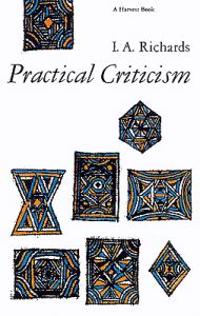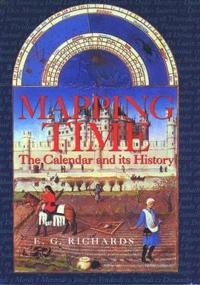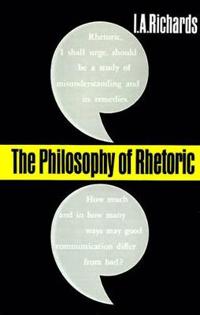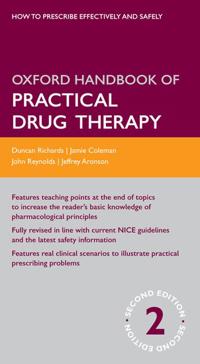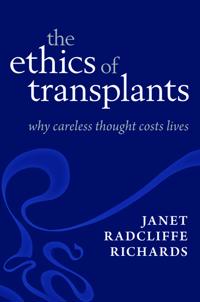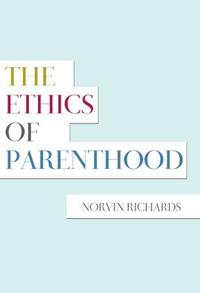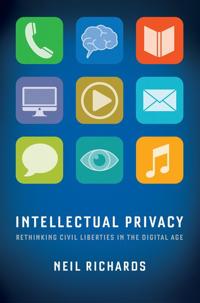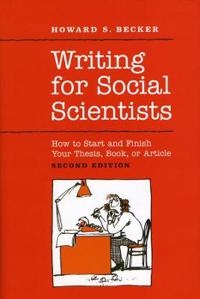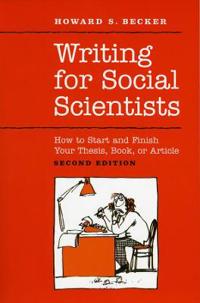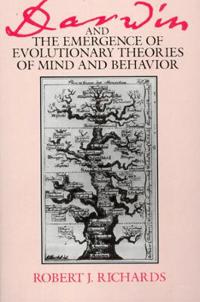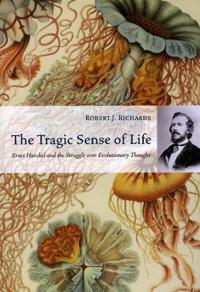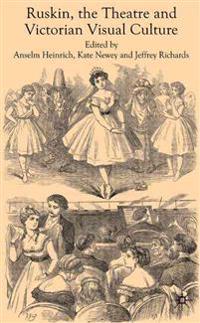Practical Criticism: A Study of Literary Judgment (Häftad)
avIvor A. Richards
ISBN: 9780156736268 - UTGIVEN: 1956-02A landmark of twentieth-century criticism that provided new standards and new techniques for examining literature. "Richards is a master of the psychology of criticism" (Saturday Review). Index.
[...]The Vikings (Häftad)
avJulian D. Richards
ISBN: 9780192806079 - UTGIVEN: 200509The Viking reputation is of bloodthirsty seafaring warriors, repeatedly plundering the British Isles and the North Atlantic throughout the early Middle Ages. Yet Vikings were also traders, settlers, and farmers, with a complex artistic and linguistic culture, whose expansion overseas led them to cro[...]
Mapping Time (Storpocket)
avE.G. Richards
ISBN: 9780192862051 - UTGIVEN: 199910Mapping Time is an account for the general reader of the history and underlying basis of each of the most important calendars of the world, from antiquity to modern times. There are descriptions of prehistoric calendars, of those devised by the Egyptians, the Mayans, the Aztecs, and other civilizati[...]
The Philosophy of Rhetoric (Häftad)
avI. A. Richards
ISBN: 9780195007152 - UTGIVEN: 196504Our communication is limitedby misunderstanding. Rhetoric, as Professor Richards defines it, is the study of misunderstanding and its remedies. The conventional rules of the old rhetoric and the formulations of scientific language have narrow application to conversational speech; Professor Richard's[...]
Foundations Of American Constitutionalism (Inbunden)
avDavid A. J. Richards
ISBN: 9780195059397 - UTGIVEN: 2000-01-01What the Doctor Didn't Say: The Hidden Truth About Medical Research (Inbunden)
avJerry A. Menikoff, Edward P. Richards
ISBN: 9780195147971 - UTGIVEN: 2006-09-07Policing Domestic Violence (Pocket)
avSharon Stratton, Simon Letchford, Laura Richards
ISBN: 9780199236749 - UTGIVEN: 2008-11-20This practical guide to policing domestic violence outlines approaches to identify victims early and target offenders through the use of intelligence. The powers available to police, including practical measures to protect victims, are outlined and supported by case studies and checklists.[...]
Wasting Heroine in German Fiction by Women 1770-1914, The (Inbunden)
avAnna Richards
ISBN: 9780199267545 - UTGIVEN: 2004-01-15British Politics (Häftad)
avDennis Kavanagh, David Richards, Judge Andrew Geddes
ISBN: 9780199269792 - UTGIVEN: 200605The fifth edition of British Politics is a significantly expanded work that draws on the contribution of three new political scientists and redresses the balance between the historical context of British Politics and key theoretical debates. British Politics 5/e overcomes the traditional problem of[...]
Oxford Handbook of Practical Drug Therapy (Pocket)
avDuncan Richards, Jamie Coleman, John Reynolds
ISBN: 9780199562855 - UTGIVEN: 201201Safe and effective prescribing is a cornerstone of proper patient care. There has in recent years been a significant increase in the numbers of healthcare professionals able to prescribe; however, sources of drug information tend to focus on only one area of prescribing. The Oxford Handbook of Pract[...]
The Ethics of Transplants (Inbunden)
avJanet Radcliffe Richards
ISBN: 9780199575558 - UTGIVEN: 201203If you die through mistakes in moral reasoning, then you are as dead as if you die through mistakes made in medicine. Organ transplantation saves lives yet thousands die every year on waiting lists through lack of organs. We are exhorted to donate; but is our individual reluctance the essence of the[...]
The Art and Science of Intelligence Analysis (Häftad)
avJulian Richards
ISBN: 9780199578450 - UTGIVEN: 201005On 11 September 2001, the Al Qaeda-sponsored attacks in New York and Washington DC marked a turning point in global security. The worldwide impact demonstrated not only that no country is an island, but also raised questions about the way the intelligence community gather its data, analysed it, and [...]
A Practical Approach To Conveyancing (Pocket)
avRobert Abbey, Mark Richards
ISBN: 9780199656486 - UTGIVEN: 2012-08-09Drawing on the authors' extensive experience in legal practice, this text provides a thorough and highly pragmatic overview of the key principles and procedures underpinning both residential and commercial conveyancing, making it essential reading for students, practitioners and licensed conveyancer[...]
Property Law Handbook (Pocket)
avRobert Abbey, Mark Richards
ISBN: 9780199676491 - UTGIVEN: 2013-08-01This is an ideal guide to the conveyancing process. Combining accessible overviews of conveyancing procedure with a pragmatic approach, enhanced by case studies, examples and professional conduct points throughout, this text equips the reader with the knowledge and skills required to conduct conveya[...]
A Practical Approach To Conveyancing (Pocket)
avRobert Abbey, Mark Richards
ISBN: 9780199678198 - UTGIVEN: 2013-08-01Drawing on the authors extensive experience in legal practice, this text provides a thorough and highly pragmatic overview of the key principles and procedures underpinning both residential and commercial conveyancing, making it essential reading for students, practitioners and licensed conveyancers[...]
The Ethics of Parenthood (Inbunden)
avNorvin Richards
ISBN: 9780199731749 - UTGIVEN: 2010-07In The Ethics of Parenthood Norvin Richards explores the moral relationship between parents and children from slightly before the cradle to slightly before the grave. Richards maintains that biological parents do ordinarily have a right to raise their children, not as a property right but as an ins[...]
Intellectual Privacy (Inbunden)
avNeil Richards
ISBN: 9780199946143 - UTGIVEN: 2015-02Most people believe that the right to privacy is inherently at odds with the right to free speech. Courts all over the world have struggled with how to reconcile the problems of media gossip with our commitment to free and open public debate for over a century. The rise of the Internet has made thi[...]
Writing for Social Scientists: How to Start and Finish Your Thesis, Book, or Article (Inbunden)
avHoward Saul Becker, Pamela Richards
ISBN: 9780226041308 - UTGIVEN: 200709Writing for Social Scientists (Pocket)
avHoward S. Becker, Pamela Richards, Howard S. Becker
ISBN: 9780226041322 - UTGIVEN: 200712Students and researchers all write under pressure, and those pressures - most lamentably, the desire to impress your audience rather than to communicate with them - often lead to pretentious prose, academic posturing, and, not infrequently, writer's block. Sociologist Howard S. Becker has written th[...]
Darwin and the Emergence of Evolutionary Theories of Mind and Behaviour (Häftad)
avRobert J. Richards
ISBN: 9780226712000 - UTGIVEN: 198712With insight and wit, Robert J. Richards focuses on the development of evolutionary theories of mind and behavior from their first distinct appearance in the eighteenth century to their controversial state today. Particularly important in the nineteenth century were Charles Darwin's ideas about inst[...]
The Romantic Conception of Life (Inbunden)
avRobert J. Richards
ISBN: 9780226712109 - UTGIVEN: 200301"All art should become science and all science art; poetry and philosophy should be made one." Friedrich Schlegel's words perfectly capture the project of the German Romantics, who believed that aesthetic approaches of art and literature could reveal patterns and meaning in nature that couldn't be u[...]
The Tragic Sense of Life (Häftad)
avRobert J. Richards
ISBN: 9780226712161 - UTGIVEN: 200909Prior to World War I, more people learned of evolutionary theory from the voluminous writings of Charles Darwin's foremost champion in Germany, Ernst Haeckel (1834-1919), than from any other source, including the writings of Darwin himself. But, with detractors ranging from paleontologist Stephen Ja[...]
Community Care: Policy and Practice (Övrig)
avRobin Means, Sally Richards, Randall Smith
ISBN: 9780230006744 - UTGIVEN: 2008-01-11This new edition has been updated to reflect recent shifts in community and social care whilst still providing the authoritative account of its historical development. Particular attention is paid to partnerships between health and social care, the regulation of social care, direct payments and indi[...]
Ruskin, the Theatre and Victorian Visual Culture (Inbunden)
avAnselm (EDT) Heinrich, Katherine (EDT) Newey, Jeffrey (EDT) Richards
ISBN: 9780230200593 - UTGIVEN: 2009-05This book brings together original research in theatre and the visual arts, around the common object of a revaluation of the intersections of the theatre and visual culture. Contributors are drawn from a stimulating mix of highly-esteemed and established scholars (such as Shearer West, Jim Davis, Ri[...]

